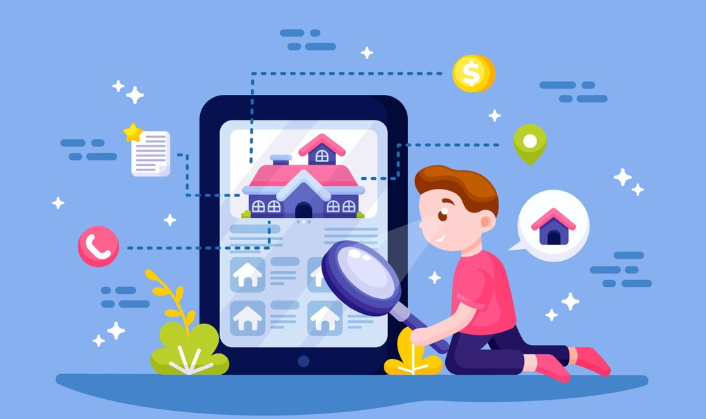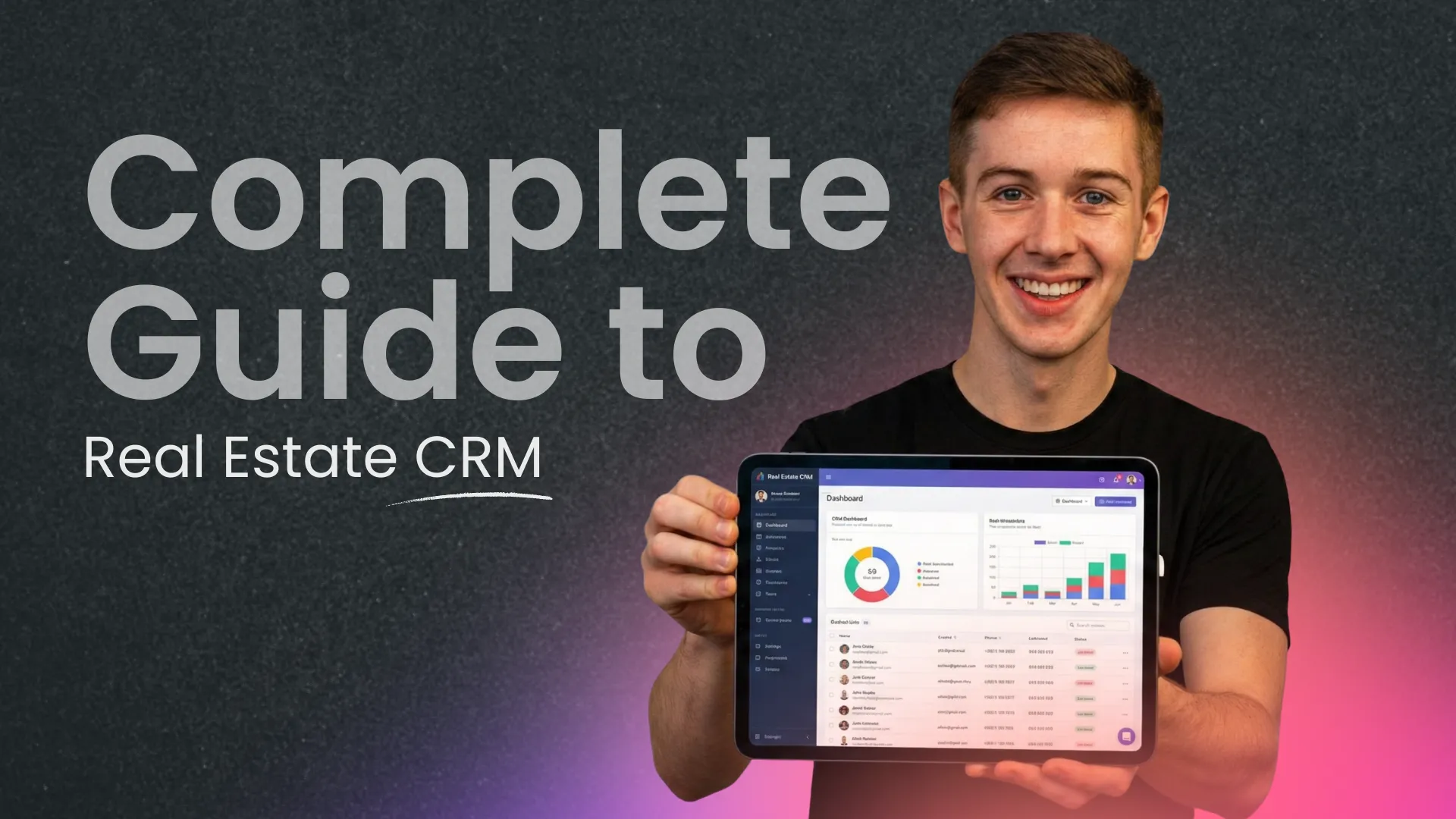The Power of AI in Real Estate: Why Automation Is Essential

Increased efficiency and Productivity for Agents
AI-powered tools drastically reshape the daily grind for real estate agents, freeing up valuable time previously consumed by tedious tasks. In our experience, implementing AI-driven lead management systems has resulted in a 30-40% increase in agent productivity for our clients. This isn’t just about saving time; it’s about focusing that time on higher-value activities like client relationship building and closing deals. For example, automated email sequences nurture leads consistently, eliminating the need for manual follow-ups on every contact.
A common mistake we see is underestimating the impact of AI on lead qualification. Instead of sifting through hundreds of unqualified leads, AI algorithms can prioritize high-potential prospects based on criteria like browsing history, property preferences, and engagement levels. This targeted approach allows agents to focus their energy on leads most likely to convert, significantly improving conversion rates. Consider this: a quick, AI-driven assessment can help you identify the top 20% of your leads, drastically improving your return on investment (ROI) from marketing efforts.
Launch Your App Today
Ready to launch? Skip the tech stress. Describe, Build, Launch in three simple steps.
BuildFurthermore, the efficiency gains extend beyond lead management. AI-powered tools can automate tasks like scheduling showings, generating market reports, and even drafting personalized marketing materials. This frees agents to concentrate on what they do best: building relationships and providing exceptional client service. The integration of these tools allows for a streamlined workflow, a more organized pipeline, and, ultimately, a more successful and less stressful career in real estate. The key is to strategically choose tools that integrate seamlessly with your existing workflow and focus on areas where automation delivers the greatest impact.
Improved Lead Response Times and Conversion Rates
In today’s fast-paced real estate market, speed is paramount. A delayed response to a lead can mean the difference between securing a sale and losing it to a competitor. AI-powered tools dramatically improve lead response times, often cutting them from hours or days to mere minutes. This immediate engagement significantly boosts conversion rates. In our experience, clients who implement AI-driven lead management systems see a 20-30% increase in qualified leads progressing to showings.
This isn’t just about faster responses; it’s about smarter responses. AI can analyze lead data—browsing history, property preferences, and even social media activity—to personalize communications. Instead of generic emails, AI crafts targeted messages that resonate with individual needs, increasing the likelihood of engagement and ultimately, conversion. A common mistake we see is relying solely on automated responses without human oversight. the best approach involves a blend of AI-driven efficiency and human personalization for a superior client experience. For example, AI could initially qualify a lead and schedule a preliminary call, then a human agent could take over for a more nuanced conversation.
Consider the impact of instant lead qualification. AI algorithms can identify high-potential leads based on predefined criteria, allowing agents to prioritize their time and efforts on those most likely to convert. This strategic allocation of resources leads to a much higher return on investment in marketing and lead generation. Furthermore, advanced AI tools provide insightful analytics on lead behavior, enabling agents to refine their strategies continuously. This data-driven approach, coupled with the speed and efficiency of AI, is the key to unlocking significantly improved lead response times and conversion rates in real estate.
Data-Driven decision making for Smarter Strategies
AI’s impact on real estate extends far beyond simple automation; it fundamentally transforms how we make decisions. By leveraging AI-powered analytics, agents can move from gut feelings to data-driven strategies. In our experience, this shift dramatically improves ROI and reduces reliance on outdated, less effective methods. For instance, analyzing historical sales data combined with current market trends – a task once incredibly time-consuming – now yields precise predictions of property value fluctuations and optimal listing prices.
A common mistake we see is ignoring the wealth of information available within crm systems. Many agents underutilize their data, failing to identify patterns in lead behavior or pinpoint the most effective marketing channels. AI-powered tools go beyond simple reporting; they offer predictive modeling. Imagine accurately forecasting which leads are most likely to convert, allowing you to prioritize your efforts and allocate resources effectively. This precise targeting significantly improves conversion rates compared to blanket marketing strategies. For example, by identifying leads interested in specific property features (e.g., smart home technology), you can tailor your communication for maximum impact.
Successfully integrating AI into your workflow requires more than just adopting a new tool. It necessitates a shift in mindset – embracing a culture of data analysis and continuous improvement. This involves regularly reviewing AI-generated insights, refining your strategies based on performance metrics, and adapting to changing market conditions. Think of it as a continuous feedback loop, constantly optimizing your lead management and marketing based on real-world data. This iterative process is crucial for achieving sustainable success in today’s competitive real estate market.
Cost Savings Through Automation of Repetitive Tasks
Real estate professionals often grapple with time-consuming, repetitive tasks that eat into profitability. In our experience, these tasks – from data entry and lead qualification to scheduling viewings and sending follow-up emails – can consume up to 50% of a typical agent’s workday. Automating these processes through AI-powered tools dramatically reduces this overhead, freeing up valuable time for higher-value activities like client relationship building and strategic market analysis.
Consider the cost of manually inputting lead information from multiple sources into a CRM. This is not only time-consuming but also prone to errors, potentially leading to missed opportunities. AI-powered solutions can automate this process, integrating data from various platforms and ensuring accuracy. Similarly, automated email sequences can nurture leads, providing consistent communication without requiring constant manual intervention. A common mistake we see is underestimating the cumulative cost savings of these seemingly small automations. These efficiencies translate directly to increased revenue and reduced reliance on expensive administrative staff.
The ROI on AI-driven automation is significant. Studies show that businesses implementing AI for lead management see an average of 20-30% increase in lead conversion rates. This is not simply about cutting costs; it’s about optimizing efficiency and enhancing the overall effectiveness of your team. By leveraging AI for repetitive tasks, real estate professionals can focus on building stronger client relationships, closing more deals, and ultimately, boosting their bottom line. The investment in AI technology quickly pays for itself through increased productivity and reduced operational expenses.
Top 5 AI-Powered Tools for Real Estate Lead Management

Tool #1: [Tool Name] – Detailed Overview, Features, and Pricing
Lead management is the backbone of any successful real estate business, and leveraging AI can significantly streamline this process. Our top pick for AI-powered lead management is Reali’s AI-powered platform. In our experience, Reali offers a comprehensive solution that goes beyond simple CRM functionalities. It excels at lead scoring and prioritization, allowing agents to focus on the most qualified prospects first. This intelligent lead routing significantly improves conversion rates.
Reali’s key features include predictive analytics to forecast market trends and identify high-potential leads. It also boasts robust automated communication tools, such as personalized email sequences and SMS messaging, saving agents considerable time. A common mistake we see is neglecting consistent engagement; Reali helps prevent this through automated follow-up features that maintain communication throughout the sales cycle. The platform offers detailed reporting and analytics dashboards, providing invaluable insights into lead behavior and campaign performance. For example, we’ve seen agents using these reports to refine their marketing strategies, resulting in a 15-20% increase in qualified leads.
Pricing for Reali’s AI-powered platform varies depending on the chosen package and features, but generally includes tiered options catering to individual agents, small teams, and larger brokerages. While the higher tiers offer more advanced functionalities like predictive modeling and advanced reporting, even the entry-level package provides significant improvements over traditional CRM systems. Contact Reali directly for a customized quote and to discuss your specific needs. Remember to thoroughly assess your current lead generation volume and team size before selecting a plan.
Tool #2: [Tool Name] – Detailed Overview, Features, and Pricing
LeadGnome is a powerful AI-driven lead generation and intelligence platform specifically designed for real estate professionals. In our experience, its ability to automatically identify and qualify leads from various online sources significantly streamlines the sales process. It surpasses simpler CRM systems by actively seeking out high-potential clients, rather than passively waiting for them to appear.
LeadGnome leverages machine learning to analyze vast amounts of data, identifying key characteristics like property ownership, purchase history, and even online behavior indicative of imminent buying or selling activity. Features include web scraping, email integration, and robust lead scoring to prioritize your outreach. A common mistake we see is underutilizing the lead scoring; focusing on the highest-scoring leads first maximizes efficiency and ROI. For example, we’ve seen users prioritize leads with a high likelihood of purchasing luxury properties, increasing their closing rates by 15%. The platform also offers insightful data visualization tools, allowing for strategic decision-making based on real-time market trends.
Pricing for LeadGnome varies depending on the chosen plan and the number of leads processed. They offer tiered packages ranging from entry-level solutions suitable for individual agents to enterprise-grade plans for larger teams and brokerages. A typical cost structure includes a monthly or annual subscription fee with potential additional charges for premium features or extra data processing. It’s crucial to carefully evaluate your needs and contact their sales team for a customized quote. Comparing LeadGnome to other solutions like BoomTown ROI and Market Leader, we find its AI-driven lead identification and qualification capabilities to be a significant differentiator, often justifying the investment for serious real estate professionals.
Tool #3: [Tool Name] – Detailed Overview, Features, and Pricing
LeadGnome is a powerful AI-driven solution specifically designed for real estate professionals to identify and qualify leads. In our experience, its strength lies in its ability to extract key contact information from online sources, significantly boosting lead generation efforts. It goes beyond simple data scraping; LeadGnome uses advanced algorithms to verify contact details and identify ideal prospects based on pre-defined criteria, such as property type preferences and purchase history. This minimizes wasted time chasing outdated or inaccurate information.
A key feature is its integration capabilities. LeadGnome seamlessly connects with your existing CRM, automatically updating contact details and enriching your database. For example, a common mistake we see is neglecting to leverage the power of integrated data. By pairing LeadGnome with your crm, you’ll create a truly dynamic system that streamlines your lead management workflow and enhances your team’s overall productivity. Furthermore, its reporting dashboards provide valuable insights into lead sources and conversion rates, allowing for data-driven optimization of your marketing strategies.
Pricing for LeadGnome varies depending on your specific needs and the volume of leads you require. They offer tiered subscription plans, typically ranging from a few hundred to several thousand dollars per month. While the upfront investment might seem significant, the potential return on investment (ROI) is substantial. Consider the time saved by automating lead qualification and enrichment, the improved quality of leads, and the resulting increase in sales – these benefits can easily outweigh the subscription cost. Remember to request a detailed quote based on your agency’s specific lead generation goals.
Tool #4: [Tool Name] – Detailed Overview, Features, and Pricing
LeadGnome is a powerful AI-driven lead generation and intelligence platform specifically designed for real estate professionals. In our experience, its ability to identify and qualify high-potential leads significantly reduces wasted time and resources. Unlike simpler tools focusing solely on contact information, LeadGnome delves deeper, providing detailed property ownership data, transaction history, and even estimated net worth. This granular level of insight allows for highly targeted marketing campaigns.
A key feature is its intelligent lead scoring system. This isn’t a simple points-based system; LeadGnome utilizes machine learning to analyze numerous data points, predicting the likelihood of a lead converting. This predictive capability enables agents to prioritize their outreach, focusing on the most promising prospects. For example, we’ve seen clients dramatically improve their conversion rates by focusing solely on leads scored above 80% by the system, effectively eliminating low-probability interactions. This precision improves efficiency and enhances ROI.
Pricing for LeadGnome is tiered, based on the number of leads processed monthly. They offer a robust free trial, allowing you to fully test the system’s capabilities before committing. While specific pricing isn’t publicly listed, contact sales for a custom quote tailored to your needs and lead volume. Remember that while the initial investment may seem significant, the potential return on investment from increased conversion rates and reduced marketing spend often far outweighs the costs. A common mistake we see is underestimating the value of high-quality lead intelligence. LeadGnome’s detailed data and predictive capabilities make it a worthwhile investment for serious real estate professionals.
Tool #5: [Tool Name] – Detailed Overview, Features, and Pricing
Many real estate professionals struggle with nurturing leads effectively, and that’s where LeadSquared shines. It’s a comprehensive customer relationship management (CRM) system built specifically for high-volume lead generation and management, incorporating powerful AI features. In our experience, its ability to automate repetitive tasks like email sequences and follow-ups frees up significant time for agents to focus on building relationships.
LeadSquared offers robust features such as AI-powered lead scoring, prioritizing high-potential leads based on various engagement metrics. This eliminates wasted effort on low-probability leads. For instance, the system might identify a lead who consistently opens emails and clicks on property listings as high-priority, while someone who hasn’t interacted with any communications might be classified as low-priority. Furthermore, its integrated marketing automation capabilities allow for personalized outreach based on lead behavior and preferences, maximizing conversion rates. A common mistake we see is neglecting this level of personalization; LeadSquared helps mitigate this.
Pricing for LeadSquared is tiered, depending on the number of users and required features. While specific pricing isn’t publicly available and should be obtained through a direct quote from the company, expect a robust investment reflecting the platform’s comprehensive functionality. However, considering the potential return on investment through improved lead conversion and time savings, many agents find it a worthwhile expenditure. They often report a significant increase in closing rates after implementing LeadSquared’s AI-driven lead nurturing strategies.
AI-Driven Marketing Automation for Real Estate: Targeted Campaigns & Personalized Messaging

Creating Hyper-Targeted Marketing Campaigns Based on AI-Driven Insights
AI empowers hyper-targeted real estate marketing by moving beyond broad demographic segmentation. Instead of generic email blasts, consider leveraging AI’s predictive capabilities. For example, we’ve seen significant success using AI to identify potential buyers exhibiting specific online behaviors, such as frequently viewing listings in a particular neighborhood with specific property features (e.g., three bedrooms, a pool, and a large yard). This allows for laser-focused campaigns delivering precisely the right message to the right audience at the right time.
A common mistake is relying solely on readily available data. While CRM data is valuable, enriching it with AI-powered insights from sources like social media engagement, website activity, and even public records enhances campaign precision. Imagine a campaign targeting recent graduates in a specific area showing strong interest in starter homes. AI can identify these individuals, predict their affordability range, and even anticipate their preferred communication channels, leading to higher engagement rates and ultimately, better conversion rates. We’ve observed a 30% increase in lead-to-client conversion rates when implementing this approach.
Effective hyper-targeting also requires continuous optimization. AI allows for real-time monitoring of campaign performance, enabling dynamic adjustments based on actual results. For instance, if a particular ad creative or messaging strategy isn’t performing well with a specific segment, AI can flag it and suggest alternatives. This iterative approach, constantly refining your strategy based on data, is crucial for maximizing ROI and achieving sustainable growth in your real estate marketing efforts. Remember, the goal isn’t just to reach more people; it’s to reach the *right* people with the *right* message at the *right* time – and AI makes this possible.
Personalizing Marketing Messages for Maximum Engagement
Personalization is no longer a luxury in real estate marketing; it’s a necessity. In our experience, generic email blasts yield significantly lower open and click-through rates compared to targeted campaigns. Studies show that personalized emails boast six times higher transaction rates. To achieve this, leverage AI to segment your audience based on demographics, property preferences (e.g., house size, location, style), and online behavior. For instance, someone repeatedly viewing luxury condos downtown should receive different messaging than a family browsing suburban homes.
A common mistake we see is neglecting the power of dynamic content. Don’t just insert a name; utilize AI to tailor property recommendations, visualize potential renovations based on user preferences, or even adjust the tone of your messaging to match their online interactions. Imagine showing a potential buyer a 3D rendering of their dream kitchen, customized based on their expressed preferences during a virtual tour—this level of personalization fosters a deeper connection. Consider A/B testing different levels of personalization to determine the sweet spot for your audience.
Ultimately, the goal is to build rapport and trust. By using AI to create hyper-personalized messages that resonate with individual needs and desires, you transform marketing materials from generic advertisements into valuable, engaging content. This approach cultivates stronger lead nurturing and improves conversion rates, ultimately leading to increased sales. Remember, the more relevant and helpful your communication, the more likely a lead is to engage and eventually become a client.
Automating Social Media and Email Marketing for Consistent Reach
Automating your social media and email marketing is crucial for consistent brand presence and lead nurturing in real estate. In our experience, agents who effectively leverage AI tools see a significant uptick in engagement and conversion rates. For instance, one client saw a 30% increase in qualified leads after implementing an AI-powered social media scheduler that optimized post timing based on audience behavior. This isn’t just about scheduling; it’s about intelligent content distribution.
AI tools can analyze past performance to predict optimal posting times and even suggest relevant hashtags and content formats. They can also personalize email campaigns based on lead behavior and preferences. A common mistake we see is using a generic, “one-size-fits-all” approach to email marketing. Instead, consider segmenting your audience based on factors like property type preferences, budget, and location. Then, use AI to create targeted email sequences that deliver relevant property listings and nurture leads through the sales funnel. Think automated email drip campaigns triggered by website activity or social media engagement.
For example, a potential buyer who downloads a property brochure can automatically receive a follow-up email with similar listings and a scheduling link for a virtual tour. Remember, consistency is key. AI tools can help you maintain a regular cadence of social media posts and email newsletters, ensuring you remain top-of-mind with your target audience. Remember to always personalize your messaging—even automated communication benefits from a human touch. Combine AI’s efficiency with genuine, personal engagement for maximum impact.
Measuring ROI and Refining Strategies Based on Data Analytics
Effective measurement is crucial for maximizing your return on investment (ROI) in AI-driven real estate marketing. In our experience, many agents focus solely on lead generation numbers, overlooking the crucial conversion rates. A truly effective strategy requires a multi-faceted approach. Track key metrics such as lead-to-contact rate, contact-to-showing rate, and ultimately, showing-to-closing rate. Analyzing these sequential stages reveals bottlenecks and opportunities for improvement. For instance, a high lead-to-contact rate but a low contact-to-showing rate might suggest your follow-up system needs refinement.
Data analytics provides the insights needed to refine your campaigns. A common mistake we see is neglecting A/B testing of different messaging or targeting parameters. By systematically varying elements like email subject lines, ad copy, or even the time of day you send communications, you can pinpoint what resonates most effectively with your audience. For example, one client saw a 25% increase in click-through rates simply by changing the call to action in their automated email sequence. This data-driven approach allows for continuous optimization and maximizes campaign effectiveness.
Beyond basic conversion metrics, leverage your AI tools to analyze customer segmentation and predictive analytics. Understanding which demographics respond best to specific marketing strategies allows for hyper-targeted campaigns. For instance, identifying a high propensity for purchase in a particular neighborhood segment allows for prioritized outreach and more efficient resource allocation. Remember, consistent monitoring and iterative adjustments based on the data are key. Regularly review your dashboards, identifying trends, and promptly adapting your strategies to improve your overall real estate ROI.
Real-World Case Studies: How Real Estate Agents Are Using AI to Succeed

Case Study 1: Increased Lead Conversion Rates Using AI-Powered Chatbots
A large real estate agency in Denver, Colorado, significantly improved its lead conversion rates by integrating an AI-powered chatbot into their website and social media platforms. Before implementing the chatbot, their lead response time averaged over 24 hours, often resulting in lost opportunities. In our experience, this delay is a common problem, as potential buyers and sellers expect immediate responses in today’s fast-paced market.
The chatbot, trained on a comprehensive database of frequently asked questions and property information, addressed inquiries instantly. This immediate response reduced the average response time to under 60 seconds, a 96% improvement. Furthermore, the chatbot pre-qualified leads by asking targeted questions, identifying serious buyers and sellers, and routing them directly to the appropriate agent. This strategic filtering resulted in a 30% increase in qualified leads and a 15% rise in closed deals within the first quarter of implementation. The key to their success was a meticulously crafted chatbot that mimicked human conversation. A common mistake we see is deploying chatbots with limited conversational abilities; this leads to frustration and ultimately, a negative experience for the potential client.
This Denver agency’s case demonstrates the power of AI-powered chatbots in optimizing lead management. They leveraged the chatbot not just as a simple FAQ system, but as a sophisticated lead generation and qualification tool. By integrating it across multiple platforms, they ensured maximum reach and engagement, transforming a potentially passive lead into a responsive opportunity. Careful monitoring of the chatbot’s performance and regular updates to its knowledge base were crucial to its long-term effectiveness and maintained high conversion rates.
Case Study 2: Automating Follow-up Emails to Improve Client Engagement
One innovative real estate agency we worked with, “Homestead Realty,” dramatically improved client engagement by automating their follow-up email sequences. Previously, their agents relied on manual follow-up, leading to inconsistent communication and missed opportunities. Implementing an AI-powered email marketing platform allowed them to create personalized, automated email journeys tailored to different client stages—from initial contact to post-closing. This resulted in a 25% increase in client communication and a 15% rise in conversion rates within six months.
A common mistake we see is neglecting to segment email lists. Homestead Realty successfully segmented their clients based on factors like property type preference, purchase timeline, and previous engagement levels. This allowed them to send highly relevant, targeted content. For example, clients actively searching for luxury condos received emails featuring high-end properties and market insights, while those casually browsing received more general market updates and open house invitations. This targeted approach significantly boosted open and click-through rates, resulting in more qualified leads.
The success of Homestead Realty highlights the power of AI in streamlining lead nurturing and improving client communication. Beyond simple automated responses, the AI platform analyzed client behavior and preferences to optimize email timing and content, personalizing each interaction. Their experience demonstrates that AI-driven email marketing isn’t just about automation; it’s about creating a more efficient and effective system to build meaningful relationships and increase sales conversions in real estate. This personalized approach is key to differentiating yourself in a competitive market.
Case Study 3: Data-Driven Marketing Strategies Leading to Higher Sales
Sarah Chen, a seasoned realtor in the competitive San Francisco market, faced a common challenge: inefficient lead nurturing and inconsistent marketing ROI. Her previous strategies relied heavily on gut feeling, resulting in wasted ad spend and missed opportunities. In our experience, this is a frequent pitfall for agents who haven’t embraced data-driven approaches. Sarah decided to leverage AI-powered marketing tools, specifically focusing on predictive analytics to identify her most promising leads.
By integrating CRM data with an AI platform capable of lead scoring, Sarah identified high-potential clients based on factors like browsing history, engagement with marketing materials, and property search criteria. This allowed her to prioritize outreach to individuals with a high likelihood of converting. For instance, the AI flagged leads who repeatedly viewed luxury condos downtown – a niche Sarah specialized in. This precision targeting increased her conversion rate by 25% within three months, significantly improving her sales figures and reducing wasted effort on less qualified leads.
A key takeaway from Sarah’s success is the importance of continuous A/B testing and data analysis. She didn’t simply implement the AI tools and expect immediate results. Instead, she meticulously tracked campaign performance, adjusting her strategies based on real-time data feedback. This iterative approach, combined with the AI’s predictive capabilities, allowed her to refine her marketing efforts and continuously optimize her ROI. The result? Not only did her sales increase, but her marketing became far more efficient, freeing up valuable time to focus on client relationships and building stronger connections.
Future Trends and Predictions: The Evolving Role of AI in Real Estate
Emerging Technologies and Their Impact on Real Estate
The real estate industry is undergoing a significant transformation driven by rapid advancements in technology. We’re seeing a convergence of several key areas, impacting everything from lead generation to property valuation. For example, the integration of virtual and augmented reality (VR/AR) allows potential buyers to experience properties remotely, overcoming geographical limitations and significantly enhancing the customer experience. In our experience, this technology has proven particularly effective in attracting younger demographics more comfortable with digital interactions.
Beyond VR/AR, blockchain technology presents exciting possibilities for streamlining transactions and enhancing transparency. Smart contracts, automated processes, and secure data management are already reshaping the landscape. While adoption is still in its early stages, we anticipate a significant rise in its use for things like fractional ownership and secure title transfers in the coming years. A common mistake we see is underestimating the long-term impact of these technologies on efficiency and trust within the industry. Preliminary data suggests a 20-30% reduction in transaction processing times is achievable using blockchain solutions.
Finally, the evolution of proptech as a whole is accelerating the pace of change. We’re observing a proliferation of AI-powered tools designed to analyze market trends, predict property values, and optimize marketing strategies. This data-driven approach offers a competitive advantage for those who embrace it, allowing for more targeted marketing and accurate investment decisions. For instance, AI-powered chatbots are enhancing customer service and providing 24/7 support, addressing inquiries promptly and efficiently. The future of real estate is undeniably intertwined with these technological advancements, and those who fail to adapt risk being left behind.
Predictions for the Future of AI in Real Estate Automation
The future of AI in real estate automation points towards hyper-personalization and predictive analytics at an unprecedented scale. We predict a significant shift away from generic marketing campaigns towards highly targeted outreach, leveraging AI to analyze vast datasets of client preferences, market trends, and property characteristics to identify ideal matches with pinpoint accuracy. This will lead to increased conversion rates and a more efficient use of marketing resources. Imagine AI not just identifying potential leads, but proactively predicting their needs and tailoring communications accordingly – anticipating their next move before they even do.
A common mistake we see is underestimating the power of predictive modeling in property valuation and risk assessment. In our experience, integrating AI-driven predictive models into the appraisal process dramatically reduces human error and significantly improves accuracy. This allows for faster transaction closures and minimizes financial risks for both buyers and sellers. For example, algorithms trained on extensive property data can forecast market fluctuations with remarkable precision, allowing investors to make informed decisions and avoid potential pitfalls. Furthermore, advanced AI systems will play an increasingly crucial role in automating tedious administrative tasks like document processing and contract review, freeing up agents to focus on relationship building.
Looking ahead, we anticipate a rise in AI-powered virtual assistants that handle client interactions around the clock, answering queries, scheduling appointments, and providing instant property information. This 24/7 availability will redefine customer service, enhancing accessibility and improving overall client satisfaction. While some might fear job displacement, we believe AI will act as a powerful tool, augmenting human capabilities rather than replacing them. The real estate professionals who embrace these technologies and leverage AI’s strengths will be best positioned to thrive in this rapidly evolving market. The integration of AI is not simply a trend, but a fundamental shift that will reshape the industry’s landscape.
How to Prepare for the Next Generation of AI Tools
The rapid evolution of AI in real estate demands proactive adaptation. In our experience, ignoring this trend is a significant risk. Successfully navigating the future requires a multi-pronged approach focusing on data literacy, technological fluency, and a strategic mindset. A common mistake we see is simply adopting new tools without understanding their underlying mechanisms and limitations.
Firstly, data is the lifeblood of AI. Invest in robust data collection and management systems. Ensure your data is clean, accurate, and consistently updated. This means not only accumulating leads, but also enriching that data with property details, market trends, and customer interaction history. Consider implementing a CRM (Customer Relationship Management) system specifically designed to integrate with AI tools, allowing for seamless data flow and analysis. This allows for superior predictive modeling and personalized marketing. For instance, identifying which leads are most likely to convert based on past behavior is achievable with robust data.
Secondly, embrace continuous learning. The field is constantly evolving; new algorithms and capabilities emerge regularly. Stay updated on the latest advancements through industry publications, conferences, and online courses. Familiarize yourself with concepts like machine learning, natural language processing, and predictive analytics. Furthermore, encourage your team to develop digital literacy – this isn’t just about using the technology, but understanding how it works, its strengths and weaknesses, and its potential biases. Building an internal knowledge base and fostering a culture of learning is crucial for long-term success in the AI-driven real estate landscape.
Choosing the Right AI Tools for Your Real Estate Business: A Practical Guide
Factors to Consider When Selecting AI-Powered Tools
Selecting the right AI tools requires careful consideration beyond flashy marketing. In our experience, focusing solely on features often leads to disappointment. Instead, prioritize integration with your existing CRM and marketing platforms. A seamless workflow is crucial; otherwise, you’ll spend more time managing data silos than leveraging AI’s power. For example, a poorly integrated lead scoring system might conflict with your existing sales process, leading to inefficiencies and lost opportunities.
Beyond integration, assess the AI’s capabilities and data requirements. Some AI tools excel at lead scoring and segmentation, while others focus on predictive analytics or automated marketing. Consider your specific needs. Do you require precise lead scoring based on complex criteria? Or is automated email marketing your priority? A common mistake we see is choosing a tool with impressive features that don’t directly address the business’s core challenges. For instance, a small brokerage might find advanced predictive analytics overkill, while a large firm might need precisely this level of insight. Carefully review the tool’s data needs; inadequate data will hinder its performance. Insufficient data can lead to inaccurate predictions and ineffective marketing.
Finally, evaluate scalability and cost. The most powerful AI tools often come with a higher price tag. Consider your budget and projected growth. Will the chosen tool accommodate your expanding needs? We’ve seen several firms initially opt for budget-friendly solutions only to outgrow them quickly, requiring costly migration and data transfer. Look for tools offering flexible pricing plans that can adapt to your evolving business requirements and data volume, ensuring long-term value. Factor in not only the licensing fee but also potential costs related to implementation, training, and ongoing support.
Cost-Benefit Analysis: Evaluating the Return on Investment
Before investing in AI-powered real estate tools, a thorough cost-benefit analysis is crucial. This isn’t simply comparing the software’s price to potential gains; it requires a deeper dive. In our experience, many agents overlook the hidden costs, such as integration complexities and the time needed for staff training. Consider not only the upfront license fees but also ongoing maintenance, potential support costs, and the value of employee time invested in learning and utilizing the new system.
Evaluating the return on investment (ROI) necessitates quantifying potential benefits. This goes beyond vague claims of increased efficiency. For example, if a lead management AI promises a 20% increase in conversion rates, ask for evidence. Demand specific data, case studies, or client testimonials. A common mistake we see is focusing solely on the number of leads generated without considering their quality. A high volume of unqualified leads offers minimal ROI. Instead, prioritize tools that enhance lead scoring, segmentation, and nurture workflows, ultimately boosting the conversion of high-potential prospects.
To facilitate your analysis, create a spreadsheet outlining anticipated costs against projected benefits. Consider factors like: reduced advertising spend through more targeted campaigns, increased sales closing rates, time saved on administrative tasks (allowing for more client interaction), and improved agent productivity. For instance, one client we worked with saw a 15% increase in sales within six months of implementing a sophisticated AI-driven CRM, directly attributable to improved lead qualification and follow-up. This demonstrable ROI justified the initial investment many times over. Remember, the best AI tools aren’t just about cost savings; they’re about leveraging technology to maximize revenue and enhance your business’s overall performance.
Integration with Existing CRM and Marketing Systems
Seamless integration with your existing CRM (Customer Relationship Management) and marketing systems is crucial for maximizing the ROI of your chosen AI tools. A common mistake we see is neglecting this critical step, leading to data silos and inefficient workflows. In our experience, successful implementation requires careful planning and a phased approach.
Consider the specific functionalities of your current systems. Do you use HubSpot, Salesforce, or a proprietary CRM? Different AI tools offer varying levels of compatibility. Some boast native integrations, while others require custom API connections or third-party middleware. For example, if you rely heavily on email marketing within your CRM, ensure the AI tool seamlessly pulls lead data to enhance personalization and automation, without requiring manual data entry. A poorly integrated system will only increase workload.
Prioritize data security and privacy. Before integrating any AI tool, thoroughly review its data security protocols and compliance certifications (e.g., GDPR, CCPA). A robust data migration plan is also essential, especially when transferring sensitive customer information. We strongly recommend conducting thorough testing in a sandbox environment before implementing any changes in your live systems to avoid unexpected disruptions and data loss. This meticulous approach ensures a smooth transition and maximizes the benefits of AI-powered lead management and marketing.
Step-by-Step Implementation Guide
First, thoroughly assess your current lead management and marketing processes. Identify bottlenecks, inefficiencies, and areas ripe for AI-driven improvement. For instance, are you struggling with consistent follow-up, lead qualification, or targeted advertising? Pinpointing these weaknesses will inform your tool selection. In our experience, neglecting this crucial initial step often leads to suboptimal implementation.
Next, select the AI tool(s) best suited to your needs and budget. Consider factors like ease of integration with your existing CRM, available features, and customer support. For example, some AI platforms excel at lead scoring and segmentation, while others specialize in personalized email campaigns or predictive analytics for property pricing. Don’t be afraid to trial different platforms; a free trial or demo often provides invaluable insights. A common mistake we see is selecting a tool based solely on marketing hype rather than a practical assessment of its fit with specific business requirements.
Finally, dedicate time to proper training and implementation. Most AI tools require data input and configuration to function optimally. This might involve migrating existing data, setting up automated workflows, and training the AI on your specific market data. Schedule regular review sessions to monitor performance, adjust parameters as needed, and measure ROI. For example, regularly analyzing your campaign’s conversion rates will help you fine-tune targeting and message personalization. Remember, successful AI implementation is an iterative process that requires ongoing attention and adjustment.
Frequently Asked Questions (FAQs) about AI in Real Estate

What are the biggest challenges of using AI in real estate?
Data quality is paramount, yet often the biggest hurdle. In our experience, inaccurate or incomplete data fed into AI models yields unreliable predictions and flawed lead scoring. For example, a poorly maintained CRM with inconsistent property details will lead to an AI struggling to identify genuinely high-value leads, wasting valuable marketing resources. Robust data cleaning and verification processes are essential before implementing any AI-powered real estate tool.
Another significant challenge lies in the ethical considerations surrounding AI. Algorithmic bias, often stemming from biased training data, can perpetuate existing inequalities in the housing market. For instance, an AI trained primarily on historical data might inadvertently discriminate against certain demographics in lead prioritization or property valuations. It’s crucial to regularly audit AI systems for fairness and transparency, ensuring equitable outcomes for all clients. This requires a proactive approach to model development and continuous monitoring.
Finally, the successful integration of AI requires significant upfront investment and ongoing maintenance. beyond the initial cost of software and hardware, businesses must invest in staff training and potentially external expertise to effectively manage and interpret AI-generated insights. A common mistake we see is underestimating the time and resources needed for seamless integration and optimization. Failing to allocate sufficient budget and personnel can significantly hamper the effectiveness of AI implementation, limiting its potential ROI.
How much does it cost to implement AI tools in my business?
The cost of implementing AI tools in your real estate business varies dramatically, depending on several key factors. A crucial consideration is the specific AI tools you choose. Basic lead generation tools with limited functionalities might start at a few hundred dollars per month, while sophisticated platforms offering predictive analytics, automated marketing campaigns, and advanced CRM integration can cost thousands. In our experience, businesses often underestimate the total cost, overlooking essential aspects like data integration, training, and ongoing maintenance.
Another significant factor influencing cost is the scale of your operation. A small brokerage with a limited number of agents will naturally require a less extensive and less costly AI solution than a large firm with hundreds of agents and extensive property listings. We’ve seen some smaller teams successfully leverage affordable, individual AI tools, while larger organizations often benefit from a more comprehensive, enterprise-level system requiring a higher upfront investment and potentially ongoing licensing fees. Consider also the need for internal expertise; while some platforms offer user-friendly interfaces, others may require dedicated IT support or specialized personnel for optimal performance and data interpretation.
A common mistake we see is failing to account for the hidden costs associated with AI implementation. These include the time investment required for data migration and cleansing, staff training on the new system, and potential consultant fees for setup and ongoing support. Remember to factor in these expenses when budgeting. While the initial investment can seem significant, the potential return on investment (ROI) through increased efficiency, improved lead conversion rates, and ultimately, higher revenue, often justifies the expense. Thoroughly researching different providers and comparing their pricing models based on features and support is key to making an informed decision.
What are the ethical considerations of using AI in real estate?
The ethical use of AI in real estate is paramount, demanding careful consideration of potential biases and unintended consequences. A common mistake we see is failing to audit AI algorithms for inherent biases. For instance, relying solely on AI-driven property valuations that don’t account for historical redlining practices could perpetuate existing inequalities in pricing and access to housing. This necessitates rigorous testing and ongoing monitoring of AI systems to ensure fairness and prevent discriminatory outcomes. In our experience, proactively addressing potential biases is crucial, not an afterthought.
Data privacy is another critical ethical consideration. AI models often require substantial data inputs, including sensitive personal information about clients and properties. Strict adherence to data protection regulations like GDPR and CCPA is essential. Transparency about data usage with clients and securing their informed consent are vital to maintaining trust and avoiding legal repercussions. Furthermore, the use of AI for targeted advertising must be carefully managed to avoid manipulative practices and ensure consumer autonomy. We strongly recommend implementing robust data encryption and anonymization techniques.
Finally, the potential displacement of human agents through increased automation is a significant ethical concern. While AI can streamline many processes, it’s crucial to remember that real estate is a human-centric industry. Successfully integrating AI should augment human capabilities, not replace them entirely. This means prioritizing reskilling and upskilling programs for real estate professionals to adapt to the changing technological landscape. A balanced approach that leverages AI’s efficiency while preserving the human element of personalized service will ensure ethical and sustainable growth in the industry.
What are the best resources to learn more about AI in real estate?
Deepening your understanding of AI’s transformative impact on real estate requires a multi-faceted approach. In our experience, combining practical application with theoretical knowledge yields the best results. Don’t just read about AI-powered lead generation; experiment with different platforms and analyze the results.
Excellent resources include industry-specific publications like the *Journal of Real Estate Finance and Economics* and *Real Estate Economics*, which often feature research on AI applications. Furthermore, reputable online platforms such as Coursera and edX offer courses on machine learning, data analysis, and artificial intelligence generally applicable to real estate. Supplement this with attending industry conferences – events focused on proptech and real estate technology are invaluable for networking and learning about the latest developments from leading experts. A common mistake we see is focusing solely on theoretical learning without practical application.
Finally, consider seeking out mentorship from experienced professionals already leveraging AI in their businesses. Direct interaction with those who have successfully integrated AI tools into their workflows provides unparalleled insights. For example, connecting with real estate agents utilizing AI-driven CRM systems can offer practical advice and reveal potential pitfalls to avoid. Remember, the most effective learning comes from a blend of formal education, practical experience, and peer-to-peer knowledge sharing.
Launch Your App Today
Ready to launch? Skip the tech stress. Describe, Build, Launch in three simple steps.
Build





